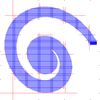
Home |
Personal Info |
Research |
Papers |
Teaching |
About |
 | PHAVerLite |
PHAVerLite (PHAVer + PPLite) is a variant of PHAVer, a formal verification tool for computing reachability of hybrid systems.
The main difference with respect to PHAVer, originally developed by Goran Frehse and later included as a plugin in the SpaceEx platform, is the replacement of the Parma Polyhedra Library (PPL) with PPLite, a software library exploiting novel representations and algorithms for the manipulation of polyhedra.
Current (and previous) versions
All the releases of PHAVerLite are available in the corresponding github page.Usage example
Try command phaverlite -v256001 osc_demo.pha.File osc_demo.pha contains the hybrid model, the configuration commands and (commented out) the graph utility command needed to produce a high quality version of the image in this web page.
Building from sources
PHAVerLite is currently developed on a Linux system. In order to build it from sources the following dependencies need to be satisfied (see file README):- a C++ compiler supporting the 2011 standard (e.g., g++ or clang++);
- reasonably recent versions of flex and bison;
- reasonably recent versions of numeric libraries GMP, MPFR and FLINT;
- a specific version of the PPLite library.
Experimental evaluation
We report the result of an experimental evalution, based on the benchmarks of the ARCH-COMP 2019 friendly competition.Support
If you need help for using PHAVerLite, ask me.Here are a few notes on PHAVerLite's specification language.
Features
PHAVerLite currently provides a subset of the functionalities offered by PHAVer, focusing on automata where:- state variable are continuous;
- each location invariant is a finite set of rational, convex, NNC (not necessarily topologically closed) polyhedra;
- each discrete transition between locations is a convex linear predicate on pre/post values of the state variables;
- the continuous dynamics at locations is modeled by piecewise constant bounds on the derivatives of state variables.
Development team
As said above, the starting point for the project was the source code of PHAVer, developed by Goran Frehse. The following people have contributed to the project:- Enea Zaffanella (main developer, supervisor)
- Anna Becchi (contributor, former student)
- Idriss Riouak (contributor, former student)
Papers
-
Anna Becchi and Enea Zaffanella
Revisiting Polyhedral Analysis for Hybrid Systems
Static Analysis - 26th International Symposium (SAS 2019) (Porto, Portugal, October 2019) -
Goran Frehse, Alessandro Abate, Dieky Adzkiya, Anna Becchi,
Lei Bu, Alessandro Cimatti, Mirco Giacobbe, Alberto Griggio,
Sergio Mover, Muhammad Syifa'Ul Mufid, Idriss Riouak, Stefano Tonetta,
Enea Zaffanella
ARCH-COMP19 Category Report: Hybrid Systems with Piecewise Constant Dynamics
6th International Workshop on Applied Verification of Continuous and Hybrid Systems (ARCH19) (Montreal, Canada, April 2019), EPiC Series in Computing.
enea.zaffanella@unipr.it
| Home | Personal Info | Research | Papers | Teaching | About